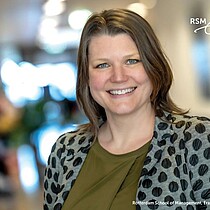

Article: Friday, 18 October 2024
Conflicts at work about hierarchy – who should lead or manage something – are not all bad. New research suggests that conflicts about hierarchy that are started for positive and prosocial reasons may lead to better team outcomes compared to situations in which such conflicts are started for self-interested reasons. The study was conducted by Dr Maartje E. Schouten, Assistant Professor at Rotterdam School of Management, Erasmus University (RSM) and Daan van Knippenberg, Houston Endowed Professor of Management – Organizational Behaviour at Jones Graduate School of Business, Rice University and Professor of Organizational Behaviour at RSM, and Lindy Greer, Professor for Management and Organizations at Michigan Ross University.
Existing research implies that employees in teams only engage in conflicts for hierarchical influence to improve their own situation. “But what we thought was purely a self-interested phenomenon – hierarchy conflict – can also be driven by prosocial motives, and this changes the dynamics of the conflict,” said Dr Maartje Schouten, whose dissertation was the foundation of the study.
The researchers produced a conceptual research paper that argues that team members may engage in a conflict of influence for positive and helpful reasons to promote social acceptance and shared goals. In these instances, the individuals might claim that the team does better when they, the individual, are in charge.
“We challenged the popular idea that hierarchy conflict is inherently bad for teams and should be avoided at all costs,” said Dr Maartje Schouten. “Our framework suggests that hierarchy conflict sparked by team-serving motives may not be bad and might even improve team functioning when it is carefully managed.
“Employees will fight for influence to do good. When they do, this may help the team. These fights are rare and should be nurtured.”
The researchers report that fostering prosocial motivation can help team members engage in hierarchy conflict for the right reasons. Other team members respond constructively when the hierarchy is challenged in this way.
Prosocial hierarchy conflicts have at least three positives:
All three of these attributes of a prosocial hierarchy conflict result in better team performance than when the conflict stems from self-interest, they say. And a uniform approach that stifles all hierarchy conflicts may hurt the team in the long term.
Conversely, if self-motivated hierarchy conflicts are allowed to develop, whether intentionally or unintentionally, the likely outcome is both more hierarchy conflict and more intense and destructive conflict exchanges.
The researchers suggest that encouraging team members to approach hierarchy conflict from a prosocial mindset can be helpful. They suggest introducing a ‘nudge’ such as tying team performance to incentives for managerial positions so employees keep in mind the interests of the team when lobbying for a higher-ranking position.
“So the next time a subordinate asks to be moved up a higher rung, give them a chance and get curious about their reasons for wanting to change the team hierarchy!” says Dr Schouten.


You can read the full research paper, Hierarchy Conflict: Causes, Expressions, and Consequences at [https://pubsonline.informs.org/doi/full/10.1287/orsc.2023.17976]


Science Communication and Media Officer
Rotterdam School of Management, Erasmus University (RSM) is one of Europe’s top-ranked business schools. RSM provides ground-breaking research and education furthering excellence in all aspects of management and is based in the international port city of Rotterdam – a vital nexus of business, logistics and trade. RSM’s primary focus is on developing business leaders with international careers who can become a force for positive change by carrying their innovative mindset into a sustainable future. Our first-class range of bachelor, master, MBA, PhD and executive programmes encourage them to become to become critical, creative, caring and collaborative thinkers and doers.
